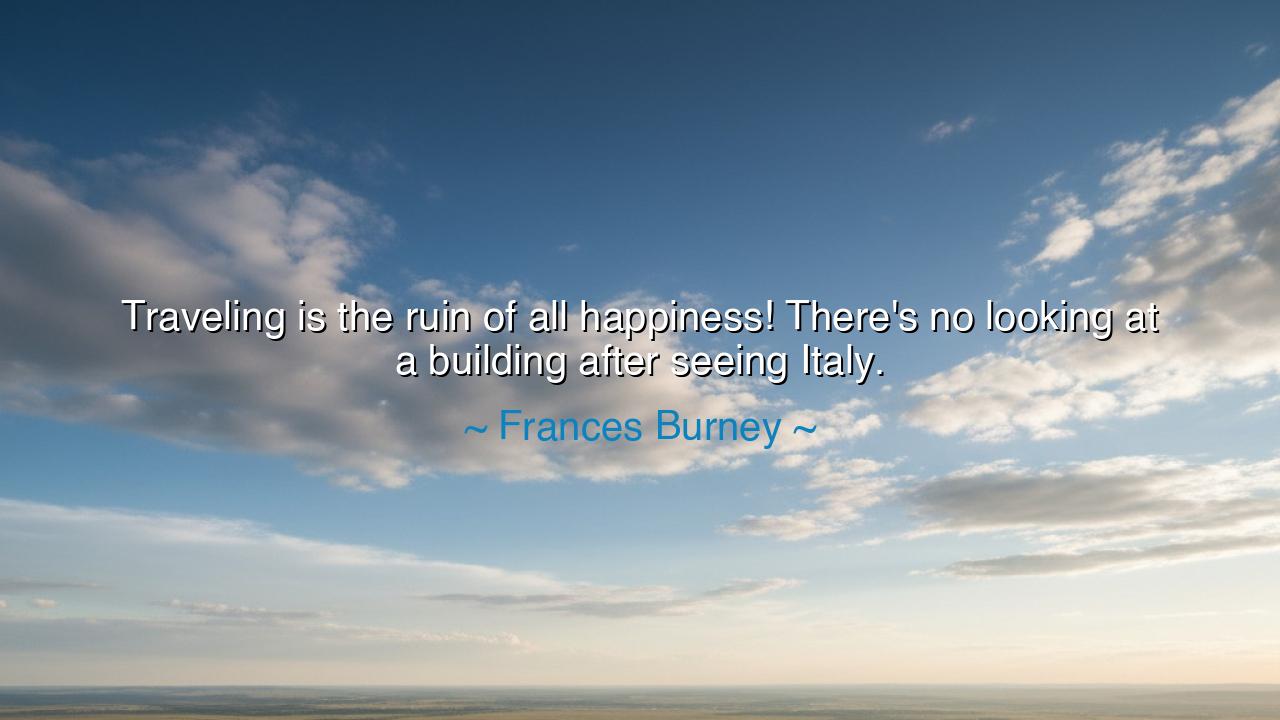
Traveling is the ruin of all happiness! There's no looking at a
Traveling is the ruin of all happiness! There's no looking at a building after seeing Italy.






“Traveling is the ruin of all happiness! There’s no looking at a building after seeing Italy.” — Thus wrote Frances Burney, the English novelist of the eighteenth century, whose wit and wisdom graced both literature and life. At first hearing, her words seem to lament the very thing that others praise — for who does not dream of travel, of seeing the world’s wonders, of filling the soul with beauty? Yet Burney’s remark, half in jest and half in sorrow, holds a truth that speaks across the centuries: that once one has tasted greatness, the ordinary can never again satisfy; once the soul has beheld splendor, it becomes restless in the face of the commonplace.
In Burney’s time, to travel to Italy was not merely to change one’s scenery — it was a pilgrimage to the heart of civilization itself. Italy was the cradle of art, the throne of the Renaissance, the land where the genius of Michelangelo, Leonardo, and Raphael had given form to divine beauty. To stand beneath the dome of St. Peter’s, to gaze upon the ruins of Rome, or to walk where poets and emperors once walked — this was to commune with immortality. For Burney, such experience, though sublime, carried a kind of curse: having seen perfection, the heart could no longer be content with mediocrity. “There’s no looking at a building after seeing Italy,” she says — for all else pales beside the divine vision once glimpsed.
The ancients, too, understood this paradox. Odysseus, after years of adventure, found himself longing for home, yet forever changed by what he had seen. The ordinary hearth that once sufficed now seemed small beside the wonders of the world. Likewise, Alexander the Great, having conquered nations, wept that no worlds were left to conquer — for the taste of the infinite makes one hungry for more. So it is with the traveler of the spirit: the higher one ascends, the harder it becomes to return to earth. This is not arrogance, but the sorrow of awakening — the ache of one who has glimpsed eternity and must still live in time.
And yet, Burney’s quote also conceals another layer — a reflection on human desire itself. For happiness, she suggests, is often rooted in simplicity and contentment. When we seek ever grander experiences, we risk losing the quiet joy that springs from the present moment. To see Italy is to know beauty, yes — but also to measure all else against it. The mind begins to compare, to judge, to crave. Thus, travel can become both revelation and ruin: it awakens the eye, but unsettles the heart. What was once enough now feels too small; what was once wonder becomes routine. The traveler learns much of the world, but sometimes loses peace within.
Yet, this “ruin of happiness” is not destruction but transformation. The soul that has seen beauty too great to forget cannot return unchanged. This, too, is part of the divine journey — the recognition that happiness is not static, but evolving. When one has seen the heights, one must learn again to find meaning in the valley. The challenge is not to forget the greatness witnessed, but to let it refine the eye, to see with new depth even in humble things. The man who has seen Rome must learn to love his own village anew — not for what it lacks, but for what it teaches about gratitude and simplicity.
Consider the story of Johann Wolfgang von Goethe, who embarked on his own journey to Italy in the late eighteenth century. Like Burney, he was overwhelmed by its beauty — the ruins of antiquity, the harmony of art and nature. In his letters, he confessed that Italy had awakened something divine within him, but it also shattered his old certainties. When he returned home, he could not fit back into the narrow molds of his former life. His happiness was, in Burney’s words, “ruined” — yet in that ruin, he became something greater: a soul expanded by vision, a poet transformed by experience.
The lesson, then, is this: when life grants you moments of greatness — whether through travel, love, art, or revelation — do not lament that they unsettle your peace. Let them unsettle you. Let them break the boundaries of your old contentment, that your happiness may grow deeper, wiser, and truer. It is better to be “ruined” by wonder than preserved by ignorance. For though Burney speaks with irony, her truth is divine: happiness is not lost by seeing greatness; it is reborn in the pursuit of meaning beyond what the eyes can see.
So remember, my child: when you stand before beauty so vast it humbles your soul — whether it be the marble of Florence or the sunrise over your own small horizon — bow in gratitude. Do not cling to the past, nor despair that lesser sights seem dim. Carry the memory within you, and let it teach you to see the sacred in all things. For the true traveler learns this at last: that Italy, or any paradise, is not a place on earth, but a state of vision — a way of seeing the world as eternally beautiful, even in its simplest form.






AAdministratorAdministrator
Welcome, honored guests. Please leave a comment, we will respond soon